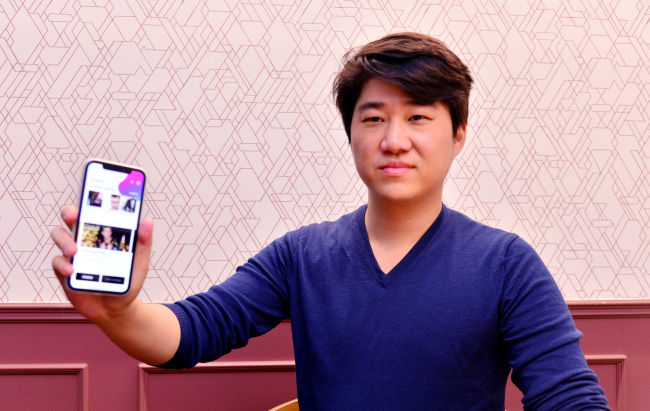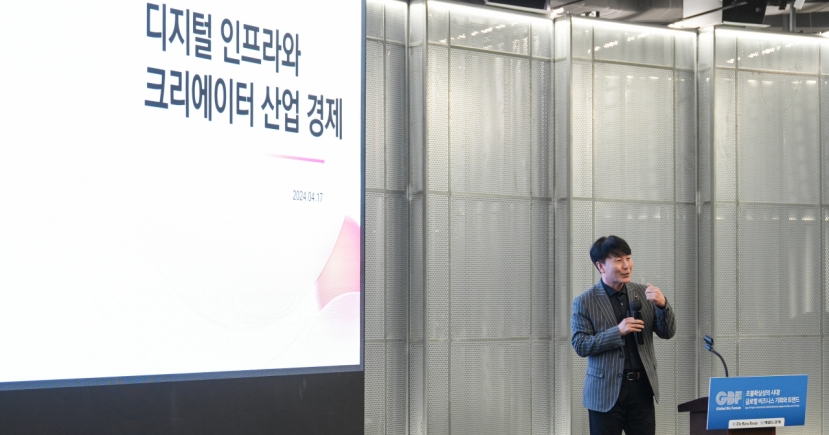Startups
[INTERVIEW] Mobile fiction startup Radish gives novels a smartphone makeover
Forbes-nominated entrepreneur from Seoul is betting on novels in the age of Netflix
 |
(Park Hyun-koo, The Korea Herald) |
Music, films, TV series and even comics are being consumed on smartphones. Now it’s time for novels to catch up.
Mobile fiction app Radish is intent on making novels happen in smartphone era.
Lee Seung-yoon founded the startup in the belief that the basis of any good entertainment is the story. Introducing his company, he said he is “in the business of selling stories.”
The entrepreneur debuted in the startup world with crowd-funding journalism project Byline.com, with an initiative to propose a substitute for “the broken model of advertising-driven journalism.” He tossed the business over to English investigative journalist Peter Jukes in 2015 and ventured into a different type of writing: the novel.
“The idea of monetizing writing without relying on advertisements is a lot more doable in fiction than in journalism,” said Lee, as he laid out his vision for novels optimized for reading on mobile devices.
Radish novels are designed precisely for smartphone consumption, presenting an even more mobilized experience of reading than e-books.
“While still a dominant digital reading medium, Kindle as a device peaked almost half a decade ago and has been decreasing in ownership ever since,” Lee said. “Now reading is happening increasingly on smartphones, which is why you have to write with the smartphone in mind.”
 |
Lee Seung-yoon, the founder and CEO of Radish (Park Hyun-koo, The Korea Herald) |
The entrepreneur from Seoul was nominated as Forbes’ under-30 with the mobile novel business in 2016. Three years later, Radish has accrued about 700,000 users, 2,000 writers and hosts over 6,500 stories.
Lee believes the scalability of his business for a new generation of readers is demonstrated by the market size of the publishing industry.
“Huge consumption and monetization are happening in publishing in billions in the US,” he said, adding, however, that it’s not adapting fast enough to the smartphone generation. “Just as you wouldn’t make two-hour videos for Facebook, you need to craft and deliver a snappier form of stories in order to engage today’s readers,” he said.
How the novel meets smartphones at Radish is its Dickensian refashioning into serials.
“Serials are a unique type of narrative characterized by strong cliffhangers, in the way many soap operas are produced,” Lee explained. “Radish novels are fragmented to be more ‘snackable’ in size, about 1,500 words per episode.”
Just as Dickens published his stories in episodes and sold them in installments at a cheap price, Radish is aiming for “the kind of affordable, low-barrier entertainment literature that appeals to the mass market.” The app found its early success in the so-called genre fiction -- i.e. romance, fantasy, mystery -- whose readers are “the earliest adapters in mobile reading,” Lee said.
The edge of a text medium is its speed of production, which the traditional publishing industry has hitherto not fully taken advantage of, he said. “Individual authorship prevails in book publishing. You work on a book for an elongated period of time, largely in solitude, and once it’s published, whether pages are being turned goes unchecked.”
Radish intends to exploit the advantages of a text narrative to its maximum potential.
“There are things you can only do with text, which is the fastest, leanest way to produce a story. With written narratives, you can feed people content every day, as opposed to videos which involve a lot more,” said the CEO.
Publishing happens at a much faster pace on Radish -- with some pieces being serialized daily -- enabled through team production by select writers. The novels are either curated or produced by its own writers to ensure a quality-controlled stream of regular uploads.
This selectivity is another way Radish differentiates itself from other creative content sharing sites such as YouTube, SoundCloud or Wattpad, where submission is open to any and all users. Explaining the selective approach, Lee likened his company to “the Netflix for serial fiction.” “Only select works are distributed on Radish, which is also how Netflix works,” he said. “People want quality content right away.”
Radish production teams closely monitor how many are reading their novels and how they’re being received through comments and chats. “While the prose is executed by writers, we incorporate reader response in coming up with the next episode. It allows spontaneous, community-driven production to take place.”
Catering to the mass market doesn’t mean forsaking quality. “TV is a forerunner in its digital evolution. You see almost movie-like storytelling happening in prime-time TV series and Netflix Originals,” he said. “Which I believe we may be able to do.”
Lee said Radish’s business model is already a proven success in Korea, and he sees a market in the English-speaking world.
“You think everyone’s playing games or watching TV nowadays, but there is demand for fiction reading. ‘Web fiction’ app Kakao Page is the fastest growing subsidiary of all the 90 or so Kakao subsidiaries and accounts for over a half of its revenue,” Lee said. Kakao, the leading mobile platform operator in Korea, launched the digital content business in 2013.
Having text as the dominant form also means a greater potential in licensing and IP opportunities, according to Lee, as it is the most adaptable IP. “A successful written work can be made into a TV drama, comics or film,” he said. “We have examples of such cross-genre transitions here (in Korea) and in Hollywood -- including ‘50 Shades of Grey,’ ‘Gone Girl’ and ‘Harry Potter.’ There are so many different ways you can go with it, it’s exciting.”
Asked about the challenges in operating a startup, he named finding the right talent as one: “It takes time to sell the vision and bring people together to form the best-performing team.” To succeed as a startup, one needs “even stronger talent than big, established companies” in order for it to “disrupt the existing industry,” he said. “Everyone has to be excellent.”
His recent recruits reflect that philosophy. Radish has now on board former VP of programming at ABC Sue Johnson as chief content officer and co-founder and former CTO of Kakao Page Shin Jong-hun as chief technology officer.
“We are intensely testing and optimizing our best creative channels to reach the audience,” Lee said. “Radish is a story production company, and our first foray into is fiction. Our grand vision is to expand and diversify into a one-source multi-use content platform.”
By Kim Arin (arin@heraldcorp.com)








